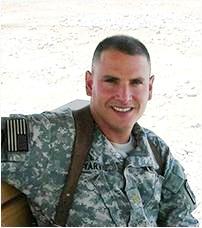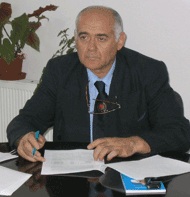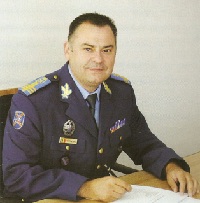State of the art
 COL. Jeffrey S. Yarvis
COL. Jeffrey S. Yarvis
COL Jeffrey S. Yarvis, PhD is a published social work and military scholar in the field of psychological trauma for nearly 30 years, has practiced internationally with disaster, domestic violence, child abuse, sexual abuse, accident, and war-induced trauma across many different cultures and populations. He has received numerous honors for his humanitarian efforts to include 2008 Uniformed Services Social Worker of the Year, 2008 U.S. Army Social Worker of the Year, numerous decorations to include the Bronze Star Medal, Combat Action Badge and induction into the Order of Military Medical Merit. He received the US Army’s Alpha proficiency designator as a full professor and military scholar in social work. COL Yarvis is currently the Deputy Commander for a medical center caring for 1/8 of the active US Army and senior behavioral health officer on his base. He also is an adjunct professor of social work at the University of Southern California.
Conference Presentation: Reintegrating Returning Warriors and the Subtleties of PTSD
Partnering with our international colleagues has enabled all participants to better address psychological injuries and the reintegration of soldiers into the workplace and their families. Understanding posttraumatic stress disorders and early intervention are key to the reintegration process. A growing literature addressing the issue of subthreshold posttraumatic stress disorder (PTSD) has appeared in recent years. However, only a small portion of this growing literature base represents empirical investigations of subthreshold PTSD and its implications. Further, the reliance on the categorical and diagnostic models of psychiatric disorders has lead to a lack of investigations into the study of the posttraumatic sequelae that fall short of full criteria for PTSD. Providers have observed substantial disability, depression and alcohol use as well as a great need for health care has been well studied for veterans with PTSD, but these associations have not been well studied in the subthreshold population. Few studies have examined the role of comorbidty and impairment in veterans with subthreshold PTSD. Understanding how to leverage evidenced-based practice in combating the effects of so-called war-induced trauma spectrum disorders is vital in addressing the “invisible wounds” of war.
 Marian Zulean
Marian Zulean
Marian Zulean is a vice-dean for research at the Faculty of Public Administration and Business and the coordinator of the social science department at the Institute for Advanced Research-University of Bucharest (ICUB). He teaches public policy analysis, national security policy and military sociology. He holds a MPIA (University of Pittsburg), a doctorate in Sociology (University of Bucharest), a postdoctoral Fulbright Fellowship (University of Maryland). He was a military officer within the Romania MoD.
Conference Presentation: Emergency preparedness in Romania: dynamics, shortcomings and policy proposals
The research paper aims to describe the risks and institutions dealing with disasters, to assess the emergency preparedness, the uses of Foresight Methodology approaches and to discover the shortcomings of the Romanian Emergency System. The empirical study - designed as a reality check- focuses on the perception of the local leaders of the emergency system regarding the most probable risks, and the uses and utility of long-term strategic planning and foresight methodologies, using the Delphi technique.
 Alin Sava
Alin Sava
Florin A. Sava received his Ph.D. in psychology from Babes-Bolyai University of Cluj-Napoca, Romania in 2005 with a thesis focusing on teacher-student interaction from a social cognition approach. Currently, he is a professor of Psychology at West University of Timisoara, Romania and the coordinator of the Social Cognition and Personality Psychology Lab. His main two administrative experiences are related to management (Chair of Psychology Department, since 2008), and to research agencies (the representative person for Psychology and Psychotherapy in the Romanian National Science Foundation, from 2009 to 2013). His research interests are related to implicit social cognition and personality psychology. He is currently a member of the executive committee of the European Association for Personality Psychology and a visiting scholar at the University of North Carolina at Chapel Hill, USA.
Conference Presentation: Implicit and Explicit Personality Assessment in the Context of Personnel Selection
Misattributions people make about their own reaction to ambiguous stimuli can be used to measure personality self-concepts implicitly. On the basis of a semantic misattribution priming paradigm [semantic misattribution procedure (SMP)], we assessed the implicit personality self-concept related to three dimensions included in the Big-Five model: conscientiousness, neuroticism, and extraversion. Across three studies (N1 = 98, N2= 140, and N3 = 135), the SMP was robustly related, in the expected direction, to individual differences in self-reported personality questionnaires and managed to predict both self-reported and objectively measured behaviours. The main advantage of SMP over classical explicit measures of personality is its higher resistance to social desirability tendencies, although its psychometric properties are somewhat lower than those pertaining to explicit measures of personality. Finally, comparisons of our results with studies that used other implicit measures of personality self-concept indicate that the SMP has higher criterion validity. Implications for psychological assessment in military context are discussed.
 Daniel David
Daniel David
Daniel David, Ph.D., is Director of Research and a Diplomate/Supervisor at the Albert Ellis Institute (AEI). He holds the Aaron T. Beck Professorship at Babeș-Bolyai University, Cluj-Napoca, Romania. Dr. David is the President/Director of the International Institute for the Advanced Studies of Psychotherapy and Applied Mental Health, as well as an adjunct professor at the Mount Sinai School of Medicine, Department of Oncological Sciences, in New York. Dr. David is the founding editor of the Journal of Cognitive Behavioral Psychotherapies, and the founding director of the ”Babeș-Bolyai – PsyTech” Psychological Clinic. He serves as President of the Romanian Board of Psychologists, Cluj Branch, President of the National Commission for Clinical Psychology and Psychotherapy on the Romanian Board of Psychologists, and President of the Professional Commission in the Romanian Association of Cognitive and Behavioral Psychotherapies.
Conference Presentation: Cross-cultural aspects of Clinical Psychology
In a globalized worlds, when cultures and people from various cultures interact more and more one another, the role of cross-cultural psychology is fundamental. In this presentation, I will explore some of the cross-cultural psychology developments, with implications for clinical assessment and interventions (e.g., counseling/clinical psychology/psychotherapy). Examples relating the psychology of Romanian people will be discussed.

Bradley Poppen
COL. (Dr) Bradley Poppen is the Director of Human Factors at the Joint Personnel Recovery Agency, where he serves as the Department of Defense’s Senior Survival, Evasion, Resistance and Escape (SERE) Psychologist. His office develops guidance for how the DoD plans, prepares for, and responds to personnel recovery events involving the isolation or captivity of DoD or other US personnel. He provides psychological expertise regarding the dynamics of captivity and isolation, the psychological impacts of captivity on the individual and how they cope and adapt in the captivity environment, support to isolated personnel and their families, and the reintegration of former hostages or prisoners of war back to work, family and society upon their return from captivity.
Conference Presentation: Principles of Post-captivity care
Individuals held hostage or in captivity may experience a variety of potentially traumatic events. Upon their return from captivity, these people face a common set of psychological needs and challenges. Understanding these needs and challenges, and successfully applying the principles of post-captivity psychological care, maximize the probability these survivors can return to healthy functioning while experiencing minimal negative psychological impacts. Individuals who have survived captivity are normal people who have survived an abnormal event, and tapping into their inherent resilience and adaptability are keys to a healthy recovery. These same principles of post-captivity care can serve as a working model to assist individuals facing a wide variety of other potentially traumatic life events.

Dragoș Iliescu
Dragoș Iliescu is a Professor of Psychology with the University of Bucharest (Faculty for Psychology and Educational Sciences). He has been active as a scientific consultant for the past 15 years, being involved in and having led important consultancy projects in Romania and other countries, mainly in Eastern Europe. In Romania, he has founded the Psyence Group, a group of scientific researchers active in several applied domains, such as test publishing, consumer psychology, management consultancy, educational testing, and occupational and vocational counseling. His research interests group around two large domains: applied psychology in the occupational and human resources area, and psychological assessment, tests and testing (with an important cross-cultural twist). Dragoș Iliescu is the immediate Past-President of the Romanian Association of Industrial and Organizational Psychology (APIO) and the President-Elect of the International Test Commission (ITC), having also served in time in other capacities for the International Test Commission.
Conference Presentation: Assessing Psychological Suitability for High-Risk Military Jobs
Behavioral assessment for high-risk military jobs has a strong psychological component. Psychological assessment contributes with important data to decisions regarding the suitability of a prospective candidate for engaging in such high-risk activities. Several psychological variables have been shown to be related to important criteria for high-risk military jobs, such as performance, adaptability, psychological resilience, etc. These variables are pooled from all areas of assessment and comprise cognitive abilities, personality, motivation, coping styles and behavioral patterns. However, there is no consensus as yet regarding the approach to the measurement and decision integration of these variables. This presentation will focus on an overview of said predictor variables, and said criteria and will discuss the several approaches taken so far to their integration in personnel decisions, arguing for psychological adaptability as a paramount criterion in any such assessment or decision.

Tudorel Butoi
COL. (retired) Tudorel Butoi is Professor at the “Spiru Haret” University, Bucharest, Senior Clinical Psychologist, and Forensic Psychologist. He is a licensed practitioner in Psychology and Law and Ph.D. in Legal Psychology. For the past 35 years, he has been active as an expert in detecting simulated behavior and in polygraph examination, being the specialist who brought the polygraph to Romania for the first time. He brought an important contribution to the theory and practice of forensic techniques and in the specific areas of the domain, offering expertise in the fields of Criminalistics and Penal Investigation. He is the author of many handbooks, studies and research papers in the fields of psychology, behavioral sciences and law.
Conference Presentation: Deception in Clinical Assessment
The purpose of this presentation is to familiarize the public with the utilization of the polygraph or, as it is more referred to, the lie detector in the investigations. Basically, the polygraph examination uses mechanical and electronic instrumentation to graphically record the physiological changes that take place in persons questioned under controlled conditions. Changes in cardiovascular activity, respiratory activity and galvanic skin reflex are recorded on a moving chart as the examiner asks the subject specific questions. These charts are then evaluated to determine whether the person’s answers present modifications showed in the diagrams by the emotional parameter in the presence of the critical neutral or control stimuli.

Vasile Marineanu
COL. Vasile Marineanu is the Head of Behavioral and Social Research Center, Romanian MOD and Adjunct Professor at the University of Bucharest. He is a licensed practitioner and Ph.D. in Psychology, as well as an Air Force Academy graduated. His scientific work includes publications and research projects in the fields of Military Psychology, Organizational Diagnosis, Psychological Operations, Clinical Psychology, and Cognitive and Behavioral Psychotherapies. In practice he is a principal psychologist, involved in clinical evaluations and specialized psychological interventions such Cognitive Behavioral Therapies with active duty military personnel as well as veterans. COL. Marineanu has over 15 years of experience in operational psychology, acquired during the operations in Bosnia-Herzegovina (1997), Kosovo (2000, 2002, 2004), and Afghanistan (2010). Between 2005 and 2008, he worked with NATO Rapid Reaction Corps in Valencia, Spain. Since 2014 he has been the Romanian national liaison officer for mental health at the NATO Centre of Excellence for Military Medicine.
Conference Presentation: The current state of Romanian military psychology, evolution and perspectives
This paper aims to make an analysis of the Romanian military psychology current state. It focuses on the conceptual development underpinning its current and future operational and clinical applications, in order to increase the effective human and organizational resource management, the individual and group performance, and to ensure effective operational stress control. This will offer a scientific framework for the structural and procedural changes in the field of military psychology, including current policies and regulations, through the mainstreaming of human behavior from the perspective of its social and individual determinants. The theoretical, methodological and practical aspects will be completed with examples of activities that impact on behavioral and organizational health in the military.
